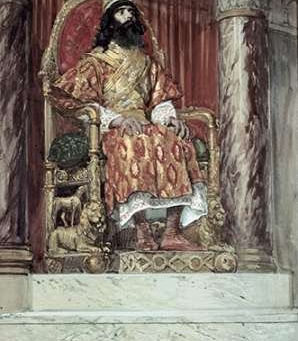top of page
From Reformation to Reformation
Ministries
Search


Poole on 1 Kings 3:10-15: God's Answer to Solomon's Prayer for Wisdom
Verse 10: [1] And the speech pleased the Lord, that Solomon had asked this thing. [ Therefore, the speech pleased ] Because the petition was ordered toward the divine honor, toward his own salvation, and toward the good government of the people (Lyra). The speech pleased the Lord : How such a dreaming prayer could please God, see in notes on verses 5, 6. Verse 11: [2] And God said unto him, Because thou hast asked this thing, and hast ( Jam. 4:3 ) not asked for thysel
Dr. Dilday
2 days ago12 min read


Poole on 1 Kings 3:5-9: Solomon's Prayer for Wisdom
Verse 5: [1] ( 1 Kings 9:2; 2 Chron. 1:7 ) In Gibeon the LORD appeared to Solomon ( Num. 12:6; Matt. 1:20; 2:13, 19 ) in a dream by night: and God said, Ask what I shall give thee. [ The Lord appeared ] In what form the Scripture has not expressed (Menochius). [ Through a dream by night [2] (thus Vatablus)] Others: in a nocturnal dream (certain interpreters in Vatablus, Piscator); through a dream in the same night (Junius and Tremellius), which immediately followed t
Dr. Dilday
4 days ago16 min read


Poole on 1 Kings 3:1-4: Solomon and Pharaoh's Daughter
[ 1014 BC ] Verse 1: [1] And ( 1 Kings 7:8; 9:24 ) Solomon made affinity with Pharaoh king of Egypt, and took Pharaoh’s daughter, and brought her into the ( 2 Sam. 5:7 ) city of David, until he had made an end of building his ( 1 Kings 7:1 ) own house, and ( 1 Kings 6 ) the house of the LORD, and ( 1 Kings 9:15, 19 ) the wall of Jerusalem round about. [ With Pharaoh ] Whose name was Vaphres [2] (Serarius, Menochius). This was pertaining to the confirmation of the kingdo
Dr. Dilday
Feb 1910 min read


Poole's Outline of 1 Kings 3: Solomon's Wisdom
Solomon marrieth Pharaoh’s daughter: high places being in use, he goeth to Gibeon to sacrifice, 1-4 . There the Lord appeareth to him; gives him a choice: he preferreth wisdom; obtaineth it, and also riches and honour. His judgment between the two harlots , 16-28 .
Dr. Dilday
Feb 161 min read


Poole on 1 Kings 2:36-46: The Execution of Shimei
Verse 36: [1] And the king sent and called for ( 2 Sam. 16:5; 1 Kings 2:8 ) Shimei, and said unto him, Build thee an house in Jerusalem, and dwell there, and go not forth thence any whither. [ He called Shimei, etc .] He wanted him to remain in Jerusalem. For there all his deeds and words were able easily to be observed: Thus an occasion for his execution was able readily to be obtained, which the king was especially seeking (Martyr). It is likely, that a man contumacio
Dr. Dilday
Feb 149 min read


Poole on 1 Kings 2:26-35: The Execution of Mighty Joab
Verse 26: [1] And unto Abiathar the priest said the king, Get thee to ( Josh. 21:18 ) Anathoth, unto thine own fields; for thou art worthy of death ( Heb. a man of death [2] ): but I will not at this time put thee to death, ( 1 Sam. 23:6; 2 Sam. 15:24, 29 ) because thou barest the ark of the Lord GOD before David my father, and because ( 1 Sam. 22:20, 23; 2 Sam. 15:24 ) thou hast been afflicted in all wherein my father was afflicted. [ Go to Anathoth (thus Pagnine, Montan
Dr. Dilday
Feb 316 min read


Poole on 1 Kings 2:13-25: The Execution of Adonijah
[ 1014 BC ] Verse 13: [1] And Adonijah the son of Haggith came to Bath-sheba the mother of Solomon. And she said, Comest thou peaceably? And he said, Peaceably. [ Peaceably, etc . ? ] Hebrew: Whether peace (or, with peace ) is thy coming? [2] (Piscator). With good reason was she able to doubt it; because he had been cast down from the kingdom by her (Menochius). Hast thou come for the sake of peace? (Vatablus). Comest thou peaceably , or with some evil design upon
Dr. Dilday
Jan 3117 min read


Poole on 1 Kings 2:5-12: David's Death-bed Charge to Solomon, Part 2
Verse 5: [1] Moreover thou knowest also what Joab the son of Zeruiah ( 2 Sam. 3:39; 18:5, 12, 14; 19:5-7 ) did to me, and what he did to the two captains of the hosts of Israel, unto ( 2 Sam. 3:27 ) Abner the son of Ner, and unto ( 2 Sam. 20:10 ) Amasa the son of Jether, whom he slew, and shed ( Heb. put [2] ) the blood of war in peace, and put the blood of war upon his girdle that was about his loins, and in his shoes that were on his feet. [ What he did to me ] That is,
Dr. Dilday
Jan 2615 min read


Poole on 1 Kings 2:1-4: David's Death-bed Charge to Solomon, Part 1
Verse 1: [1] Now ( Gen. 47:29; Deut. 31:14 ) the days of David drew nigh that he should die; and he charged Solomon his son, saying… Verse 2: [2] ( Josh. 23:14 ) I go the way of all the earth: ( Deut. 17:19, 20 ) be thou strong therefore, and shew thyself a man… [ I go the way of all the earth [3] (similarly all interpreters)] Of all the earth’s inhabitants (Arabic, thus Vatablus). That is to say, I sense that I am going to die soon, just like all the rest (Vatablu
Dr. Dilday
Jan 209 min read


Poole's Outline of 1 Kings 2: David's Unfinished Business
David lying on his deathbed, giveth charge to Solomon of a religious life , 1-4 . Of Joab, Barzillai, and Shimei , 5-9 . He dieth: Solomon succeedeth , 10-12 . Adonijah suing for Abishag, is put to death , 13-25 . Abiathar is deprived of the priesthood , 26, 27 . Joab fleeing to the horns of the altar is slain there , 28-34 . Benaiah is put in Joab’s room, and Zadok in Abiathar’s , 35 . Shimei confined to Jerusalem; going thence to Gath is put to death , 36-46 .
Dr. Dilday
Jan 181 min read


Poole on 1 Kings 1:41-53: Adonijah Pardoned
Verse 41: [1] And Adonijah and all the guests that were with him heard it as they had made an end of eating. And when Joab heard the sound of the trumpet, he said, Wherefore is this noise of the city being in an uproar? [ Adonijah heard ] See what great haste Nathan employed in this business. For it was a plan not able to be commended unless accomplished with expedition (Grotius). As they had made an end of eating ; for Nathan having given wise counsel, took all due care
Dr. Dilday
Jan 1610 min read


Poole on 1 Kings 1:32-40: Solomon Anointed King!
[We could use your help: If you are being blessed by the translation work, please consider supporting the work and speeding it on its way. Click here to watch a brief video on the project.] Verse 32: [1] And king David said, Call me Zadok the priest, and Nathan the prophet, and Benaiah the son of Jehoiada. And they came before the king. Verse 33: [2] The king also said unto them, ( 2 Sam. 20:6 ) Take with you the servants of your lord, and cause Solomon my son to rid
Dr. Dilday
Jan 613 min read


Poole on 1 Kings 1:22-31: Nathan's Address, and David's Resolution
Verse 22: [1] And, lo, while she yet talked with the king, Nathan the prophet also came in. Nathan the prophet also came in : To discourse with the king; which made it fit for her to withdraw, as she did, verse 28. Verse 23: [2] And they told the king, saying, Behold Nathan the prophet. And when he was come in before the king, he bowed himself before the king with his face to the ground. [ And they announced to the king, etc .] The stewards, who kept the doors, and w
Dr. Dilday
Jan 36 min read


Poole on 1 Kings 1:11-21: Bath-sheba's Desperate Plea
Verse 11: [1] Wherefore Nathan spake unto Bath-sheba the mother of Solomon, saying, Hast thou not heard that Adonijah the son of ( 2 Sam. 3:4 ) Haggith doth reign, and David our lord knoweth it not? Nathan was prompted to this both by his piety in fulfilling the will of God declared to him, and by him to David, concerning Solomon’s succession, 2 Samuel 7:13; 1 Chronicles 22:8, 9; and by his prudence, as knowing that Adonijah hated him for being the principal instrument of
Dr. Dilday
Dec 30, 202512 min read


Poole on 1 Kings 1:5-10: Adonijah's Usurpation of the Throne
Verse 5: [1] Then ( 2 Sam. 3:4 ) Adonijah the son of Haggith exalted himself, saying, I will be king ( Heb. reign [2] ): and ( 2 Sam. 15:1 ) he prepared him chariots and horsemen, and fifty men to run before him. [ He was lifted up (thus the Septuagint, Montanus)] By his ambitious spirit (Menochius). מִתְנַשֵּׂא, [3] efferebat , he was raising ( efferens / raising [Tigurinus, Junius and Tremellius]) himself (Pagnine, similarly the Arabic, Munster, Vatablus). Lifte
Dr. Dilday
Dec 22, 202512 min read


Poole on 1 Kings 1:1-4: David and Abishag
[ 1015 BC ] Verse 1: [1] Now king David was old and stricken in years ( Heb. entered into days [2] ); and they covered him with clothes, but he gat no heat. [ King David had grown old ] That is, he was seventy years of age (Piscator, [3] Malvenda, [4] Lyra, [5] Menochius, [6] Serarius, [7] Junius [8] ); as it is evident out of 2 Samuel 5:4, 5 (Malvenda out of Junius). Stricken in years ; Being in the end of his seventieth year. [ And, although he was covered in cloth
Dr. Dilday
Dec 18, 202512 min read


Poole's Outline of 1 Kings 1: Solomon's Ascension
Abishag cherisheth David in his extreme age , 1-4 . Adonijah usurpeth the kingdom , 5-10 . By the counsel of Nathan to Bath-sheba, and their petition to David, he reneweth his oath of making Solomon king after him , 11-31 . He, by David’s appointment, is anointed king; the people triumph , 32-40 . Adonijah hearing this, his guests flee, and himself fleeth to the horns of the altar; is pardoned by Solomon, and sent to his own house , 41-53 .
Dr. Dilday
Dec 15, 20251 min read


Wendelin's "Christian Theology": Doctrine of the Lord's Supper, Part 2
[ If you are being blessed by the translation work, please consider supporting the work and speeding it on its way. Click here to watch a brief video on the project. ] THESIS VIII: Hitherto the words of the commandment . They are the words of promise, which make known and disclose the thing signified in sacramental expression, even concerning the external symbols: as concerning the bread, this is my body ; concerning the cup, or [the wine] in the cup, this is my blood of
Dr. Dilday
Dec 13, 202537 min read


Poole on 1 Kings: The Argument
These two Books called Of the Kings , because they treat of the kings of Judah and Israel, were written by the prophets, or holy men of God, living in or near their several times, and by some one of them digested into this order. But whoever was the penman, that these are a part of those Holy Scriptures which were Divinely inspired is sufficiently evident first, From the concurring testimony of the whole Jewish church in all ages, to whom were committed the oracles of God ,
Dr. Dilday
Dec 10, 20252 min read


De Moor's Theological Disputation on Ephesians 5:14: How Does the Prophecy Serve the Apostle's End?
Finally, it remains to respond in a few words to the seventh Question mentioned in § 1, How does the Apostle, in citing this prophecy, reach the goal that he intends? tying verse 14 with what precedes by the logical conjunction διό/ wherefore . In context, Paul addresses believing Ephesians, who were sometimes darkness, but now were made Light in the Lord , verse 8. He had instruct these, in verse 11, καὶ μὴ συγκοινωνεῖτε τοῖς ἔργοις τοῖς ἀκάρποις τοῦ σκότους, μᾶλλον δ
Dr. Dilday
Dec 9, 20252 min read
bottom of page